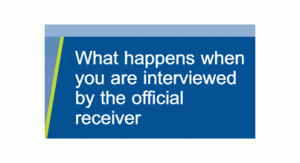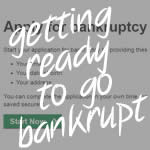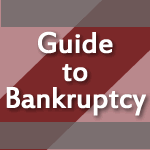After you go bankrupt, you will have an interview with the Official Receiver, an Income Payments Arrangement may be set, and most people will be discharged after 12 months. This page looks at these events and how much difference going bankrupt makes to your life.
It is the last of three pages about bankruptcy. The first page dealt with the main questions people want answered and the second page looked at getting ready for bankruptcy and the bankruptcy application.
This page assumes you have already taken the decision to go bankrupt – but it’s useful reading even if you are still thinking through your options.
The interview with Official Receiver
Most people have an interview with the OR’s office – a few people are told no interview is needed and just sent some forms eg GDPR to sign.
The interview with the OR’s office will occur after your bankruptcy application has been approved – often a week or two later. It is usually a telephone interview but it can be at the OR’s offices. If you don’t want a telephone interview you can ask to have one in person. It will normally last for 3-4 hours. Occasionally there will be a need for a further interview. You may be asked to complete a questionnaire in advance or to provide certain documents – in practice bring all your financial documentation, not just the items specified. If your interview is by phone, clear a large table and spread the stuff you may need out.
You may be asked to complete a questionnaire in advance or to provide certain documents – in practice bring all your financial documentation, not just the items specified. If your interview is by phone, clear a large table and spread the stuff you may need out.
You may be asked questions about your bankruptcy application by one of the OR’s examiners. They will be mainly interested in what has happened in the last five years. You may be asked in more detail what you spent money on.
Don’t worry if you haven’t got written records going back five years (who has?) or if you can’t remember something, or if you borrowed money on one credit card to pay the monthly payments on other debts. Yyou know now that is foolish, but it is very common and it will not result in a Bankruptcy Restriction Order unless you have done it on an enormous scale for years.
You must co-operate with the OR and don’t try to conceal anything.
If you do not co-operate you may be arrested and questioned in court and ultimately you may not be discharged in 12 months. At the interview the Perjury Act will be explained to you and you will have to sign to say that you have understood this.
They are asking all these questions so that they can feel reasonably sure that you are telling the truth and aren’t hiding anything. They aren’t judgmental – no-one is going to suggest that you shouldn’t have bought a new car or gone on holiday, even if you now think that was a stupid thing to have done. They won’t get angry or criticise. They are professionals doing a job, but they are not there to give you advice.
At the end of the interview you may be asked to find certain written records – statements, receipts etc.
Just do your best – you are not going to get a Bankruptcy Restriction Order (BRO – see below for more about these) because your paperwork is missing bits unless the OR thinks you are concealing something.
Life when bankrupt
Creditors and bank accounts
You must stop using your existing credit straight away
You must not obtain credit of more than £500 without informing the creditor that you are bankrupt
You are allowed to open a new Basic Bank Account.
You should immediately stop making any payments to your unsecured creditors.
You should carry on paying the mortgage and any secured loans unless you have left the property or intend to shortly. You should also carry on making payments towards any debts which will not be extinguished by your bankruptcy – check with the OR if you are unsure if a debt is being wiped out by bankruptcy or not.
The OR will inform your creditors of your bankruptcy but this can take a few weeks. If you are contacted by any of your unsecured creditors during this period, just quote your bankruptcy reference number to them – that will be the last time you hear from them.
Income and tax
If you have sufficient disposable income, you will have to make monthly payments to the OR under an IPA, see below.
You must inform the OR of any assets and increases in income that you get before you are discharged, including any lump sums such as a bonus, a redundancy payment or an inheritance.
The tax owing for all tax years up to and including the tax year in which you are made bankrupt will be paid to the OR. So if you pay tax under PAYE, your tax code will be changed to a nil rate code for the remainder of the tax year.
If you are self-employed, your duty to pay tax directly to HM Revenue and Customs will no longer apply to the tax year of bankruptcy or any previous year, except for self-employed workers in the construction industry, who will continue to have tax taken off their earnings at a flat rate of 18% after bankruptcy.
You won’t be better or worse off because of these tax changes – you may get more through your pay packet, but that will increase the amount you pay to the OR. If you are unsure of what to do, ask the OR to explain.
Self employment
If you are self-employed, your existing business is normally closed down and any employees will be made redundant. They may be able to make a claim to the National Insurance Fund for outstanding wages, redundancy etc.
Any business assets will become the property of the OR unless they are exempt (eg tools that you will need to continue in business).

You can start to trade again, subject to restrictions. You are not allowed to be a Company Director and as mentioned above you are not allowed to obtain credit of more than £500 without informing the creditor that you are bankrupt. You will need to register again for VAT.
To discuss how bankruptcy will affect your business, call Business Debtline.
If you want someone to buy out your share of the equity in your house, or any of your other assets, they should contact the OR as soon as possible after your bankruptcy order to progress this. If house prices rise, the amount that has to be paid will also increase.
Will I have to make monthly payments (IPAs )?
Most people don’t have to make monthly payments in bankruptcy. In 2022-2024, about 16% of bankruptcy orders made resulted in an IPA – that is about 1 in every 6 people going bankrupt.
If, after looking at your monthly income and expenditure, you have over £20 of disposable income, you may have to make monthly payments under an Income Payment Agreement (IPA). This is an amount that you will have to pay each month for three years from the date the IPA is made i.e. you will carry on making these payments after you are discharged.
An IPA has to be started before you are discharged – if one isn’t, then you will not have to pay one even if your income increases significantly after your discharge.
The OR can go to court and get an Income Payment Order (IPO) set if you refuse to agree to an IPA. This is very rare, just a handful of people a year from 2020. So I only mention IPAs here.
If your only income comes from benefits, you will not have to pay an IPA/IPO.
This may all sound very scary, but the Guidance Notes for the OR state:
Whilst the assessment of income and expenditure with regard to obtaining an IPA/IPO is intended to provide a return to the creditors where possible, it must also be remembered that the bankruptcy legislation is intended to provide the individual with an opportunity to start afresh and remain solvent in the future, so his/her expenditure should not be cut to a level where he/she will have difficulty funding his/her reasonable domestic needs.
The IPA amount is completely flexible:
- – it can be reduced to zero if necessary. So if you lose your job or go on maternity leave, your rent goes up or you get extra expenses after having a baby, these will all be taken into account.
If your income increases or you get a bonus, your IPA will go up.
Your partner (or spouse – being married is irrelevant) doesn’t have to contribute money to your IPA, but they do have to make reasonable contributions to household costs, which will reduce the expenses that you have to pay.
The OR can’t generally have any effect on what you earn – if you want to walk out of your well-paid job and be a student for three years that is your choice. (The only exception here is pensions. This is a complicated area and if you are over 55 and what happens to your pension will affect your decision to go bankrupt, you should get advice on this.)
Bankruptcy Restrictions Orders
About 1 in 30 people who go bankrupt get a Bankruptcy Restrictions Order (BRO) because the Official Receiver thinks they have been dishonest or to blame for their debts.
That may sound worrying – almost everyone feels that they have been in some way to blame for their bankruptcy, and many people may have exaggerated their income a bit when applying for credit cards.
But if this is the first time that you have gone bankrupt, you are unlikely to get a BRO unless a lot of your debts come from gambling or you have ended up owing large tax debts from your business.
See Will you get a Bankruptcy Restriction Order (BRO)? Does it matter? for details.
Your credit record
Bankruptcy stays on your credit record for six years. During this time you will find it hard to get credit.
You can start the process of repairing your credit record after you are discharged.
When will I be discharged?
You will receive an automatic discharge from bankruptcy after 12 months unless you have not co-operated with the OR and the OR goes to court to suspend your discharge. This is very rare.
After you are discharged from bankruptcy, all the restrictions and obligations mentioned of bankruptcy will cease with two exceptions:
- if an IPA has been imposed before your discharge it will continue until three years have passed. During this time if you have an IPA you still have to inform the OR of changes in your earnings.
- if you have had a Bankruptcy Restriction Order imposed, you will still be discharged but some of the restrictions in bankruptcy will continue after your discharge.
For full details about discharge, read What happens when I am discharged from bankruptcy?
Bankruptcy – summary
Pros gets rid of your debts. Most people dont have to make any monthly payments. If you do have to make payments this is only for 3 years and they can be decreased if your expenses go up or your income falls. Bankruptcy gives you certainty – it can’t ‘fail’ like other debt options can
Cons may affect your job, your house is at risk, will always have to be declared when you apply for a mortgage
Debt Camel says If you don’t own a house and your job will not be affected, this is a good option if you owe more debt than you can hope to repay in a reasonable timescale. Other people need to balance the pros and cons of this against the other possible debt options.
If you haven’t yet looked at them, this would be a good time to check out the Hard Choice pages: IVA vs bankruptcy, long DMP vs insolvency, and Selling the house.
<



Amy says
I had a large amount of credit card debt and took out personal loans to clear the debt at a better interest rate. I took redundancy 12 months ago and used half of my settle to pay off some debts and live off as I couldn’t return to work straight away due to a health challenge.
Although struggling to pay, I could pay and wasn’t in arrears and still had a comfortable life.
I had a car on pcp and sold it to we buy any car, I didn’t need it and it was very expensive to pay each month. I bought a cheap second hand car instead.
My partner lost his job, he was self employed but on a contract for a building firm, he had a company van.
He needed his own van for work and couldn’t get credit, I borrowed the money in personal loans and from my credit card so he could purchase a van. He was paying this off each month, he couldn’t get credit himself.
We were 6 months into the payments and he sadly passed away from a heart attack. He didn’t have savings or life insurance, we weren’t married so any money from
His bank account didn’t come to me.
I now have all this debt and cannot afford to pay, bankruptcy seems like the only way out.
Will I be allowed to file for bankruptcy? Will I need to send proof that he has passed away? His Mum has his death certificate and won’t share with me, I don’t know how else to get one.
I’m scared and devastated, I feel so overwhelmed, life has changed so quickly.
Sara (Debt Camel) says
How large are your debts at the moment?
Amber says
Hi
I wondered if you could help me with an IPA query please. My income will be universal credit and student loans/grants which I believe can’t be used for an IPA.
However, I also should be getting child maintenance. I’ve done a realistic budget and I can comfortably live on my income without all of the child maintenance.
Does the OR look at this as the child maintenance being my only income therefore too little to set an IPA. Or is it a case of benefits/student income can’t be used for an IPA but we know you have enough to live on therefore can set an IPA with the child maintenance.
The child maintenance income has only recently been set up aswel and there are some issues there which mean I may not even receive it from my ex consistently. What happens if I get an IPA but then don’t get the maintenance some months?
Thank you for your help.
Sara (Debt Camel) says
I think you should talk to a debt adviser about this and your other options. It may be better to postpone a decision until after you have a better feel for how often the maintenance will be paid.
Amber says
Thank you for responding. I will definitely speak to someone before making a decision.
If the child maintenance does get paid regularly/ consistently, for arguments sake, do you know how the IPA is likely to go please if this money is ‘spare’ after benefits and student finance?
Sara (Debt Camel) says
Talk to an advisor, sorry, the allowances for groceries, clothes, kids things etc may be more generous than you expect.
Fred says
Hi Sara, am currently looking at filing for bankruptcy, I was looking into a DRO but I was told that I’ve made preference payment in the past two years so won’t be approved( which I don’t understand I have) anyway am just wondering after you been made bankrupt, do you have to provide bank statements during the 12 months and does the OR check your bank account ect during the 12 months. Thanks
Sara (Debt Camel) says
who have you been talking to about a DRO? what is this preference payment?
Fred says
Money wellness, am waiting to hear from them because I didn’t understand it. From what I made from the phone call it was paying another debt off last year with a new loan. (Debt consolidation) I haven’t made any payments to my creditors now for 3 months. I meat all the criteria for a DRO but the indemnity person said my application will unlikely be accepted because of this preference payment so I didn’t follow through with the application
Sara (Debt Camel) says
were you paying all your creditors last year? until you stopped paying them all?
Fred says
Yes I was paying all the creditors payments although 4 of the debts were within the last 12 months and 1 more recently taken out in January. Made one payment towards that recent one, then stopped making payments after that but to all my debts. I haven’t paid any of my debts in the past 2 months and coming into my third month now. If that makes sense. I have used a lot in past two years wasted on gambling but I have told them this. Am aware that a DRO wouldn’t be refused because of that but could get a DRRO. I just feel like my only option now is bankruptcy
Sara (Debt Camel) says
So this doesn’t sound like preference to me – that is where you were choosing to pay some debts and not others. Choosing to clear some debts with a consolidation loan is not preference (unless you were choosing to repay friends and family?) if you were still paying the other debts the normal payments. And taking a loan in January may have been unwise or reckless, but that is a matter for a potential DRRO as you say, it’s not preference.
So you have asked MW to explain why this is preference? I would be interested in the answer…
Fred says
Yeh very confused by it all to be honest. Since they are the experts in this field then they must be right. Il see if I can get a response from them.
Sara (Debt Camel) says
well… actually MW are the new kids on the block when it comes to doing DROs. Your other option is to go to your local Citizens Advice and ask them for a DRO
Fred says
Hi Sarah, I had got back in contact, explained how I felt and didn’t understand what was said to me about preference payment. Anyway I got an appointment with an intermediate today to write my application. This was Very different from the last phone call with an intermediate. Very quick and sent my application off to the insolvency. So will wait on the response now now sure how long. Anyway thanks for your reply’s
Penelope says
I have a lot of unsecured debt, around £40K. This is a result of constantly moving balances from one place to another, subsidising my income while I was a student and paying for unexpected things over the last 6 or so years.
At present I haven’t missed any payments but I am beginning to struggle, have had to use credit cards to pay for other credit commitment and am always in my overdraft and my repayments equal more than 70% of my income. I take home approximately £2100 a month.
My husband is the sole owner of our home and pays all of the household bills. However, our relationship has broken down and we are likely to separate but my debt means I am unlikely to be able to afford to move out.
Would bankruptcy be a suitable option.
Sara (Debt Camel) says
I think you need to sort out where you will be living before considering any form of insolvency. If this means renting somewhere privately, then you need a deposit and the first months rent. And possibly also a guarantor if your credit record is very poor.
Have you spoken to a solicitor?